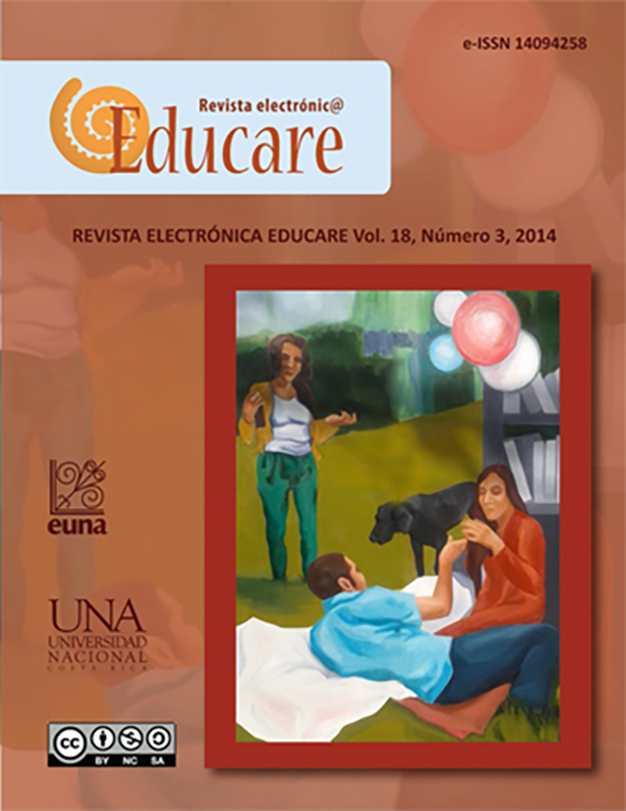Music Education based on Competencies in Spain: Necessity or desire?
DOI:
https://doi.org/10.15359/ree.18-3.14Keywords:
Music education, elementary education, cultural and artistic competence, working using competencies.Abstract
This paper is aimed at critically analyzing the implementation of a system based on competencies in the Spanish curriculum, more specifically in music education. Our current society, subject to vertiginous transformations, is demanding an effective educational response, as well as updated teaching and learning processes. In this context, this study has confirmed the need for both teachers and learners to acquire practical skills and to use active methodologies in the music field. Consequently, curricular contents will become of secondary importance and emphasis will be given to developing competencies that enable individuals to perform tasks and solve problems in real life situations. However, taking into account the importance still given to the traditional expository lecture approach, these changes raise questions about its viability in schools. Due to the inherent nature of music, working with competencies is more adequate in music than in other subjects, and, although its use is necessary to introduce students to music, reality is different than what is desired. The novelty of the topic and its practical implications make it a focus of interest for studies and reflections, like the one presented in this paper, in order to get a better understanding of this phenomenon and establish effective educational actions.References
Alsina, P. (julio-septiembre, 2007). Educación musical y competencias: Referencias para su desarrollo. Eufonía. Didáctica de la Música, 41, 17-36.
Álvarez, M. M. (enero-junio, 2011). Perfil del docente en el enfoque basado en competencias. Revista Electrónica Educare, 15(1), 99-107. Recuperado de http://www.revistas.una.ac.cr/index.php/EDUCARE/article/view/872
Cano, E. (2005). Cómo mejorar las competencias de los docentes. Guía para la autoevaluación y el desarrollo de las competencias del profesorado. Barcelona: Graó.
Council of Europe. (2001). Common European Framework of Reference for Languages: Learning, Teaching, Assessment [Marco común europeo de referencia de las lenguas: Aprendizaje, enseñanza, evaluación]. Cambridge: Cambridge University Press. Recuperado de http://www.coe.int/t/dg4/education/elp/elp-reg/Source/Key_reference/CEFR_EN.pdf
De Moya, M. V., Hernández, J. A., Hernández, J. R. y Cózar, R. (2009). El docente, eje vital de la competencia emocional. En E. Nieto y A. I. Callejas (Coords.), Las competencias básicas. Reflexiones y experiencias (pp.1109-1114). Ciudad Real: Universidad de Castilla-La Mancha.
Eurydice (2002). Las competencias clave. Un concepto en expansión dentro de la educación general obligatoria. Madrid: Ministerio de Educación.
Giráldez, A. (2007). La competencia cultural y artística. Madrid: Alianza.
Giráldez, A. (marzo, 2011). Educación musical y competencias transversales. Aula de Innovación Educativa, 200, 36-39.
Gómez, N., Pérez, M. y Arreaza, F. (2007). Documento de apoyo: Programación, desarrollo y evaluación de las competencias básicas. Toledo: Consejería de Educación y Ciencia de Castilla-La Mancha. Recuperado de http://juancarlos.webcindario.com/documento_de_apoyo_Programacion_desarrollo_y_evaluacion_de_las_CCBB_Fernando_Arreaza_.pdf
Hernández, J. A., García-Cobos, F. J., García-López, F. J., De Moya, M. del V. (2009). El mapa geográfico-musical y la competencia cultural y artística en educación primaria. En E. Nieto y A. Callejas (Coords.), Las competencias básicas. Reflexiones y experiencias (pp. 573-580). Ciudad Real: Universidad de Castilla-La Mancha.
Ley Orgánica de Educación (LOE) 7899 de 2/2006 de 3 de mayo de 2006. (4 de mayo de 2006). Boletín Oficial del Estado, núm. 106. Recuperado de http://media.wix.com/ugd/094c3b_f604f3e82bef9969c7b04a302292401f.pdf
Malbrán, S. (julio-septiembre, 2007). Las competencias del educador musical: si, pero... Eufonía. Didáctica de la Música, 41, 37-48. Recuperado de http://eufonia.grao.com/revistas/eufonia/041-competencias-en-educacion-musical/las-competencias-del-educador-musical-si-pero-
Maldonado, A. (Coord.). (2004). Libro blanco. Título de grado en magisterio (Vol. 1, 108). Madrid: Aneca. Recuperado de http://web.upcomillas.es/eees/Documentos/libroblanco_magisterio1_v5.pdf
McClelland, D. C. (enero, 1973). Testing for Competencies Rather than for Intelligence [Evaluar por competencias en lugar de por inteligencia]. American Psychologist, 28, 1-14. Recuperado de http://citeseerx.ist.psu.edu/viewdoc/download?doi= 10.1.1.315.7091&rep=rep1&type=pdf
Organización para la Cooperación y el Desarrollo Económico (OCDE). (2002). Proyecto DeSeCo: Definición y selección de competencias. Bruselas: Comisión Europea. Recuperado de http://www.deseco.admin.ch/bfs/deseco/en/index/03/02.parsys. 78532.downloadList.94248.DownloadFile.tmp/2005.dscexecutivesummary.sp.pdf
Parcerisa, A. (julio-septiembre, 2007). Las competencias como referentes para la práctica educativa. Eufonía. Didáctica de la Música, 41, 6-16.
Vallvé, L. (julio-agosto, 2009). Reflexiones en torno a la competencia artística y cultural. Una mirada desde la educación plástica y visual. Aula de innovación educativa, 183-184, 11-15.
Zabala, A. y Arnau, L. (2007). 11 ideas clave. Cómo aprender y enseñar competencias. Barcelona: Graó.
Downloads
Published
How to Cite
Issue
Section
License
1. In case the submitted paper is accepted for publication, the author(s) FREELY, COSTLESS, EXCLUSIVELY AND FOR AN INDEFINITE TERM transfer copyrights and patrimonial rights to Universidad Nacional (UNA, Costa Rica). For more details check the Originality Statement and Copyright Transfer Agreement
2. REUTILIZATION RIGHTS: UNA authorizes authors to use, for any purpose (among them selfarchiving or autoarchiving) and to publish in the Internet in any electronic site, the paper´'s final version, both approved and published (post print), as long as it is done with a non commercial purpose, does not generate derivates without previous consentment and recognizes both publisher's name and authorship.
3. The submission and possible publication of the paper in the Educare Electronic Journal is ruled by the Journal’s editorial policies, the institutional rules of Universidad Nacional and the laws of the Republic of Costa Rica. Additionally, any possible difference of opinion or future dispute shall be settled in accordance with the mechanisms of Alternative Dispute Resolution and the Costa Rican Jurisdiction.
4. In all cases, it is understood that the opinions issued are those of the authors and do not necessarily reflect the position and opinion of Educare, CIDE or Universidad Nacional, Costa Rica. It is also understood that, in the exercise of academic freedom, the authors have carried out a rogorous scientific-academic process of research, reflection and argumentation thar lays within the thematic scope of interest of the Journal.
5. The papers published by Educare Electronic Journal use a Creative Commons License:














 The articles published by Educare Electronic Journal can be shared with a Creative Commons License:
The articles published by Educare Electronic Journal can be shared with a Creative Commons License: 



